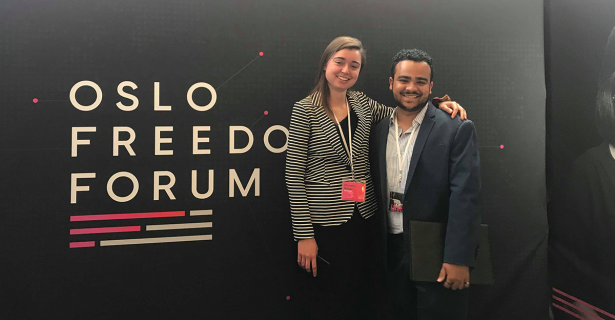In May, I had the privilege of attending the Oslo Freedom Forum in Oslo, Norway. For three days I had the opportunity to listen and engage in discussion with several human rights activists. As a result of this experience, I learned a great deal about a wide range of topics and made connections with people who I consider to be inspiring role models.
As part of the Oslo Scholars program this year, I have the privilege of interning with Leyla Hussein over the summer. Leyla Hussein is a psychotherapist, writer, specialist on female genital mutilation (FGM) and gender rights, and lead campaigner working to end violence against women and girls.
On the second day of the Forum, I was invited to join Leyla for breakfast. After I arrived, a few or her friends and fellow activists joined us at our table. At one point in the meal, I looked around and realized I was surrounded by incredible people who are at the forefront of worldwide efforts to resist tyranny.
The conversation evolved into each person sharing the threats that had been made on their lives. I was taken aback by the almost casual way in which they shared how their lives were put in danger on a daily basis due to the nature of their work. It hit me then, that even though all of the activists at the forum did such different work, the common thread tying them together was courage.
Each presenter, on the big stage and in the breakout sessions, demonstrated their commitment to pursuing goals of attaining human rights regardless of the personal consequences. It was clear that sometimes this strategy produced dramatic results quickly, this was especially true in the case of Brian Fogel. The director of Icarus, an award-winning investigative documentary, Fogel single-handily launched an investigation of the Russian regime’s doping program.
Other speakers had similarly launched massive, life-long projects of social and cultural change without the same level of international recognition. Many of these people faced serious repercussions as a result.
For instance, on the third day of the conference, Walid al-Hathloul spoke on behalf of his sister, Loujain al-Hathloul, who is currently in Saudi prison after advocating against the ban on women driving. From his description of her, it was clear that Loujain had put everything on the line to challenge the culture of oppression against women in Saudi Arabia. This courage runs in the family, as her brother is continuing her fight while she is detained.
This theme was also obvious in the session called Defending the Defenders, in which three environmental activists shared their stories. For one of the questions, the interviewer pointed out what each of the speakers had lost due to their activism efforts, and then asked if they thought it was worth it. I was moved by the fact that each person replied, without even a second of hesitation, that the end result would justify their sacrifices.
The theme of resistance no matter the costs was especially present amongst those speakers representing minority groups. Hearing all of the women speak reminded me of how far the fight for women’s rights has yet to go in many places around the world. Many of the presenters were also advocating on the behalf of underrepresented religious or ethnic groups in their home countries. It was, at times, difficult to hear about all of those who were experiencing backlash based on their identities.
Although there were no speakers who dealt with the U.S., attending the conference made me aware of the fact that human rights abuses are perpetrated everywhere in the world, including my own country. It takes courage to recognize issues at home, to develop solutions and then to create change no matter the cost.
More than anything, the Oslo Freedom Forum was a huge inspiration to me. I was incredibly impressed by all of the people, coming from vastly different places and walks of life, but who shared admirable levels of courage.

